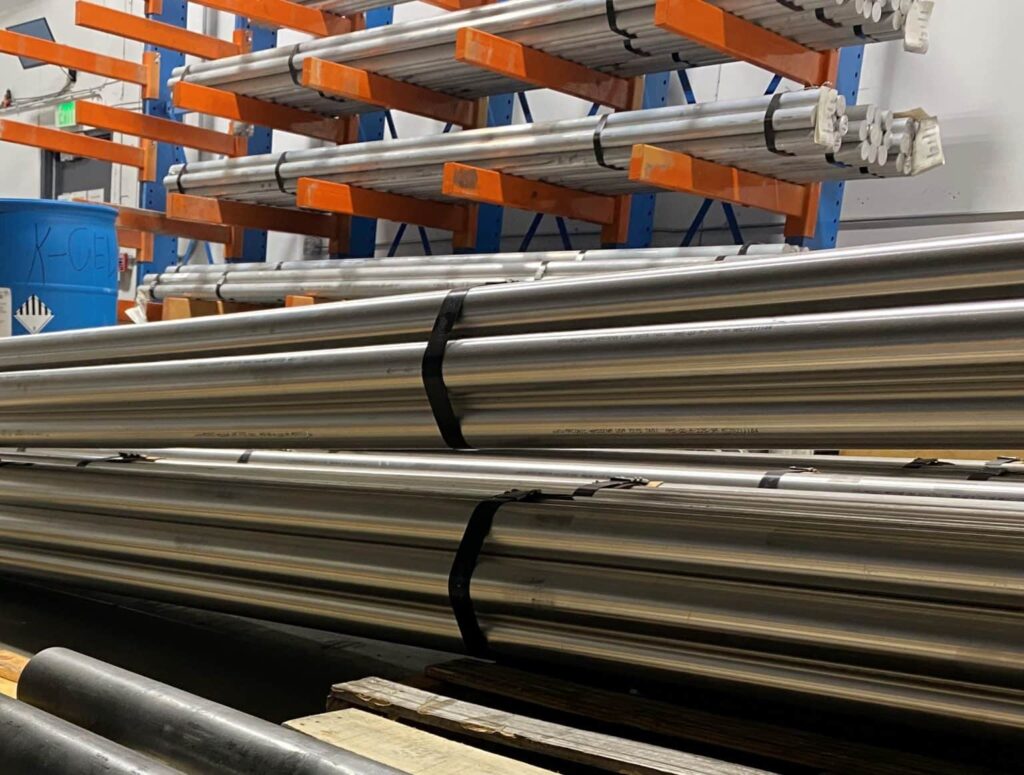Achieving high rate production of machined components requires raw materials that can keep pace with manufacturing. Primus Aerospace utilizes aluminum bar stock to supply CNC lathes for aerospace and defense production. Our purchasing, material handling, and operations teams are very familiar with the processes necessary to ensure steady production.
Example raw materials used for production CNC machined parts
- 7055 Aluminum Alloy – 7055 Aluminum (A7055) is a high strength heat-treatable aluminum alloy that it primarily used in aerospace & defense applications. It is primarily used for high stress parts and was originally formulated by Alcoa.
- 7075 Aluminum Alloy – 7075 Aluminum (A7075) is an aerospace alloy that is used in applications requiring high specific strength. It was first developed by the Japanese during World War II for use in the Mitsubishi A6M Zero Fighter.
- 17-4 Stainless Steel – 17-4 steel (SAE 630) is a chromium-nickel-copper steel alloy that is generally used in high strength and corrosion resistive applications for aerospace, nuclear, and chemical processing applications.
- Invar – Invar (FeNi36 or 64FeNi) is a high-nickel iron alloy that is used in applications where minimal thermal expansion is needed. The alloy was invented by Swiss physicist Charles-Édouard Guillaume. It is often used in precision instruments, optical applications, and telescopes.

Materials supply chain prepares raw materials for machining
- Raw Component Mines – Raw inputs to the metal are sourced from mines around the world. For example, to produce aluminum, mines must extract and refine the minerals (e.g., corundum) to produce bauxite.
- Raw Component Refining – Once the minerals are mined, they are refined through mechanical and chemical processes into standardized chemistries. Many metal inputs require multiple refining and purification steps. For aluminum, the processes finally result in alumina.
- Smelting Mill – Inputs are heated to smelting temperatures in large furnaces to achieve chemically standard alloys (e.g., 6061 Aluminum) and are finished into ingots or billets. For the rest of the manufacturing value chain, the material remains chemically the same.
- Finishing Mill – This step moves the standardized allow billet into it’s final shape and finish. For bar stock, the ingots will be heated and pressed through an extrusion mold to achieve the form needed for the CNC lathes. While many options exist for softer aluminum alloys, only specialty mills are capable of extruding harder 7000-series aluminum.
- Distributor – Metals distributors act as intermediaries for end users who need smaller quantities than the mills are willing to produce. These distributors may stock metals to service short term demand (“spot purchase”) as well as coordinate the longer term delivery for on-going production. In many cases, the distributor may also perform value added services to further prepare the metal for CNC machining (see next bullet).
- Intermediate Processes (e.g., heat treating, precision grinding) – Specialty bar stock often requires intermediate processing to prepare the raw material for CNC machining on a mill turn lathe or swiss screw machine. These processes will often harden the metal or tighten the tolerances around the extruded metal shape to within 0.001″.
Materials are processed prior to moving to CNC machine
- Receive – All incoming raw materials are received in accordance with Primus Aerospace’s Quality Management System. This ensures that only the proper materials are received and that they are entered into our ERP correctly (against a previously placed PO). Material certifications (“certs” are collected at this time.
- Inspect – Primus’s quality inspectors match up shipping documentation and certifications with the actual raw material. Additionally, they will perform any non-destructive material testing that is required by the work order.
- Saw Cut – Bar stock from the supplying mill generally comes in 12 foot bars. While this length works great on our Swiss screw machines, our larger mill turn lathes need shorter bars to fit into their automated bar feeders. We utilize a CNC saw to cut the long raw material bars into shorter sections. For example, Primus will take a 12-foot section of aluminum bar stock and cut it into three 4 foot bars for use on a mill turn part.
- Issue To Job & Stage – Once the material is prepared, it is loaded on a job-specific cart and issued to the work order for production. This ensures that the material is not used for any other application and includes a printed page showing where the material is headed.



